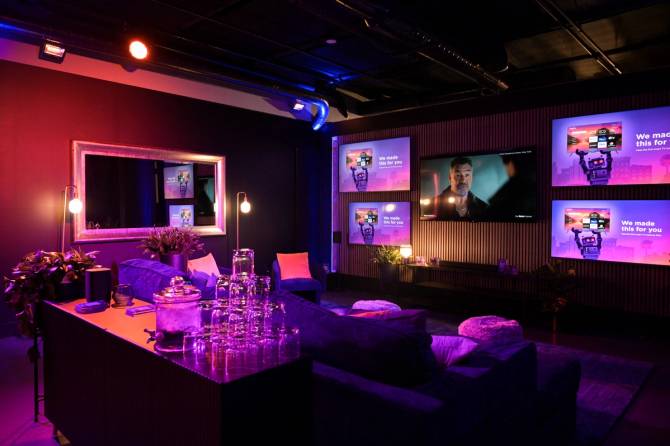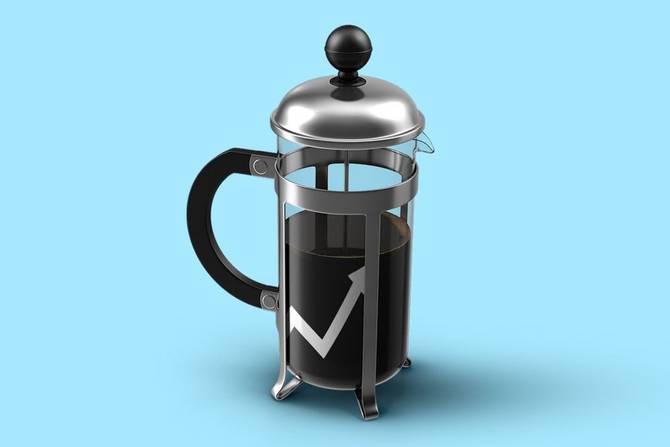Happy Thursday. Yesterday, Kellogg said its snacking unit, which houses brands like Cheez-It, Pop-Tarts, and Pringles, will be named Kellanova. We guess it’s better than…Comirnaty?
In today’s edition:
—Alyssa Meyers, Kelsey Sutton
|
|
Neslihan Gorucu/Getty Images
Audio, largely considered an up-and-comer compared to ad channels like social and CTV, is showing signs of maturing. Some signs, like podcast ad revenue crossing the $1 billion milestone in the US, are positive. Others, like potential ad fraud schemes, are less so.
- Last month, brand-safety firm DoubleVerify said it uncovered a “scheme” it’s calling BeatSting involving alleged audio fraud that has cost “unprotected advertisers” up to $1 million per month, or potentially as much as $20 million over the past few years, according to Roy Rosenfeld, head of the company’s Fraud Lab.
- “You’re seeing an explosion in podcasts and other types of audio inventory, but it still doesn’t really meet the increasing demand,” Rosenfeld told Marketing Brew. “As soon as you have this imbalance between demand and supply, especially in these high-engagement channels like CTV and obviously audio as well, this just creates an opportunity for fraud and invalid traffic.”
DoubleVerify isn’t the only brand-safety firm eyeing the topic: Last summer, Integral Ad Science said 87% of media experts it surveyed were “concerned about ad fraud in audio.” A month later, IAS announced that its ad measurement tool would be available for use on Pandora, enabling advertisers to detect invalid traffic on the platform.
Zoom out: Still, some marketers said they haven’t identified it as a major concern quite yet, at least among podcast advertising, partly because they’re not purchasing ads programmatically at a large scale.
Lisa Jacobs, VP of media operations at Ad Results Media, said that ad fraud “hasn’t been an issue” for the radio and podcast agency. That’s largely because it focuses on host-read endorsements and performance marketing, she explained. “As we expand our programmatic buying, I’m sure this will become more of a topic. But…I don’t see large risk here for our clients.”
Read the full story here.—AM
|
|
|
After analyzing over 80m videos on their platform (whew) and surveying 1,500+ marketers, Wistia’s annual State of Video Report is BACK—and it’s juicier than ever.
Video marketing is truly booming, and Wistia’s 2023 State of Video Report shares the inside scoop on what’s growing, what’s slowing, and what’s catching clicks in the world of branded video.
See how other businesses are leveraging video content + where and how consumers are watching, then leverage these fresh insights for your biz in 2023 and beyond.
Video is only getting more popular and powerful, and Wistia covers topics like video distribution, creation, strategy, and engagement. Why? To highlight the future of video marketing, the content that shines, and the trends that are here to stay.
Download your free copy.
|
|
Roku
Would you live here? In Roku City? This year at SXSW, Roku bet on it.
At the annual event in Austin, Texas, the connected-TV maker partnered with the tech retailer Best Buy to recreate Roku City—aka the virtual cityscape screensaver that appears on Roku devices when content isn’t playing—in real life.
The multi-level pop-up, open for two days this week, featured aubergine everything: A dimly lit luxury entertainment room, an indoor park, a style shop featuring purple hair extensions and face jewels, and a rooftop diner serving purple-hued food and beverages.
The park came complete with a coffee cart that served Austin-based roaster Creature Coffee and Gigi’s Cupcakes, featured on an episode of Roku Original series The Cupcake Guys, while the rooftop diner’s menu included odes to popular TV shows and movies like The Big Salad (inspired by Seinfeld), French Fry Forest (made with purple potatoes and inspired by Inside Out), and a slice of apple pie called I’ll Have What She’s Having—a reference, of course, to When Harry Met Sally. Creative production agency DesignScene helped bring the space and its menu to life.
Big picture: The idea behind the installation, according to Julian Mintz, Roku’s head of US brand sales, was born out of the steadily rising interest in and cultural conversation around Roku City over the last few years—whether that’s the 1,000-word New York Times profile on the fictional metropolis from last fall, Roku City merchandise, or the many internet memes. According to company metrics, Roku City is mentioned every 12 minutes on Twitter, and two in three Roku users said they would visit Roku City.
“Bringing it to life, in real life, is the next logical step,” Mintz told Marketing Brew.
Read more about the activation here.—KS
|
|
TOGETHER WITH INTUIT MAILCHIMP
|
|
Emails that pop. Wanna know how to expand your audience and boost brand awareness? Six Barrel Soda has the buzz. They’ve mastered getting around challenging social algorithms by using Mailchimp’s email marketing and integration tools to keep customers coming back for more. Add a li’l fizz to your emails.
This is sponsored advertising content.
|
|
There are a lot of bad marketing tips out there. These aren’t those.
TikTok: A breakdown of the app’s new STEM feed, which it announced this week.
LinkedIn: The platform introduced the LinkedIn Podcast Academy, a “six-month incubator pilot” to help growing business podcasts.
Google: Details about the core algorithm update rolling out this month.
Seen and heard: Did you know you could end your day with our collection of the top quotes, activations, and ads, you need to see plus afternoon headlines? Check out Double Shot.
Real-time data: With Signals, Tagger’s social intelligence engine, marketers can leverage valuable data and insights to research industry trends, optimize creative content, grow social followings, and drive campaign results.* *This is sponsored advertising content.
|
|
-
ByteDance is reportedly facing a demand from the US government to divest from TikTok or risk a nationwide ban of the app.
-
Meta’s Facebook Ireland unit “improperly used personal data of Dutch citizens between 2010 and 2020,” an Amsterdam court ruled.
-
Anheuser-Busch InBev won the Cannes Lions Creative Marketer of the Year award for the second year in a row, becoming the first repeat winner.
-
Snapchat will start to publish its content moderation guidelines that detail what kinds of content the platform’s algorithm shows users.
|
|
Morning Consult took a deep dive into Gen Alpha, the youngest generation, by surveying 2,000 of their parents. These 0- to 9-year-olds are “already influencing purchasing,” according to the report, titled “A Brand’s Guide to Gen Alpha.” 
Born to browse: More than half (54%) of Alphas own tablets, and 11% own a VR headset. About one in four (26%) live in a house with a VR headset.
- While only 28% of Gen Alpha parents said they support their children interacting with the metaverse right now, 58% said they’d support metaverse participation when their kids are older. Maybe all those brands that set up shop in the metaverse were on the right track after all.
The kids are being influenced: Of all Gen Alpha parents surveyed, 56% said their kids watch shopping content like haul and unboxing videos. Of parents with children ages 0–4, 48% said their kids watch that content. Our question is: Literally, how?
- Whatever the answer, some children appeared to already have brand preferences, with just under half of Gen Alpha parents saying kids make requests for specific brands in categories like groceries and snacks, TV shows, and clothes.
+1: Gen Alpha’s “clear favorite restaurant” is McDonald’s, according to their parents.
|
|
Catch up on a few Marketing Brew stories you might have missed.
|
|
|
Written by
Alyssa Meyers and Kelsey Sutton
Was this email forwarded to you? Sign up
here.
Take The Brew to work
Get smarter in just 5 minutes
Business education without the BS
Interested in podcasts?
|
ADVERTISE
//
CAREERS
//
SHOP 10% OFF
//
FAQ
Update your email preferences or unsubscribe
here.
View our privacy policy
here.
Copyright ©
2023
Morning Brew. All rights reserved.
22 W 19th St, 4th Floor, New York, NY 10011
|
|








